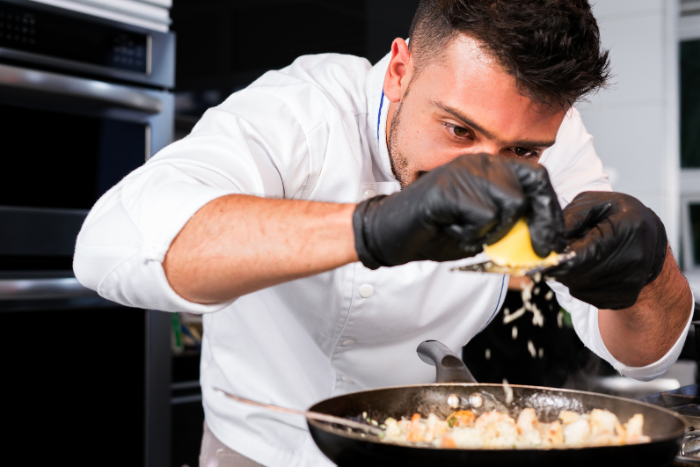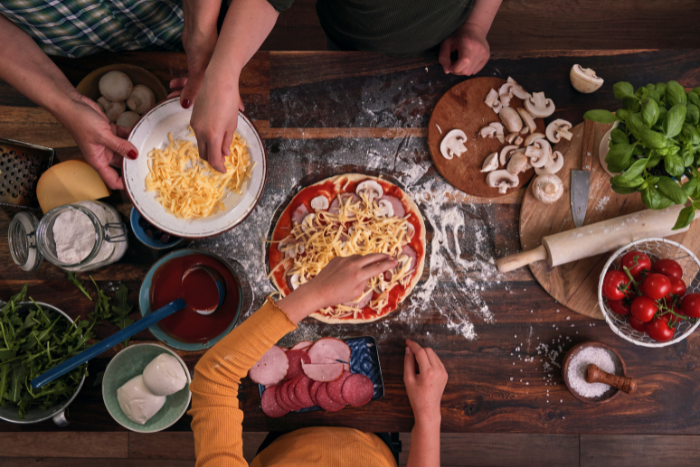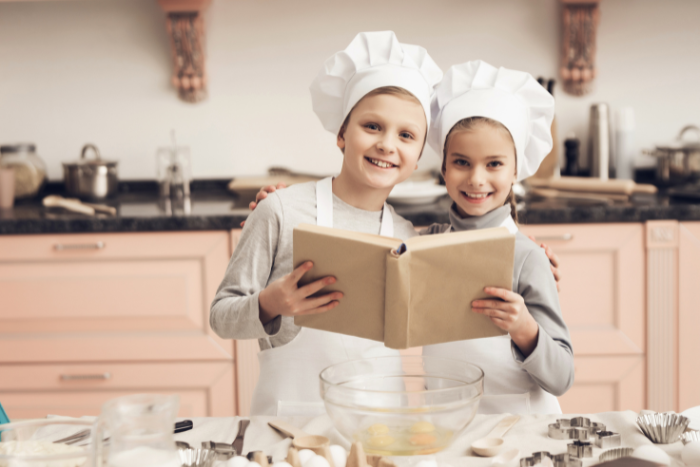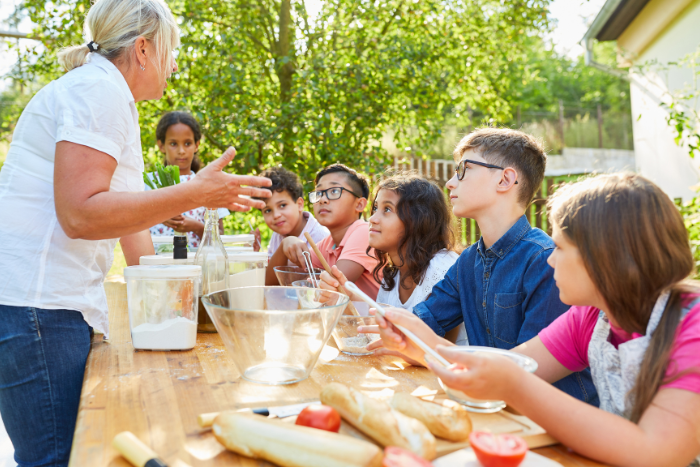Involving your kids in cooking is a great way to try new foods, spend time together, learn basic life skills, and … teach science! Cooking is science, and the chemistry of cooking can be understood by both young learners and high schoolers alike.
So, how can you inspire your future chefs with science? We have a few easy ways to get started.
But first…

The Chemistry of Cooking
We often think of food creation as an art, and while it most certainly is, it’s also embedded in science! For example, why do you use baking powder instead of baking soda in pancakes? Or, why must caramel be heated to an exact temperature, or else it’s ruined? What is fermentation? How come gluten makes bread taste SO good?
These are just a few of the questions you have probably thought of while cooking, or maybe your student has asked them while helping you!
In basic terms, cooking changes the composition of foods. Dry ingredients like flour and sugar can mix with wet ingredients like eggs and milk to create a warm and fluffy texture that we know as the pancake! Cookbooks are filled with recipes for every kind of food imaginable, but have you ever noticed how specific the measurements are? Why can’t you use one egg instead of two? Because chemistry, that’s why! Each food ingredient that cooks around the world use has a chemical composition that plays an integral role in creating meals, whether it’s grilled, frozen, boiled, baked, etc!

In professional kitchens, trained chefs use chemistry to their advantage as they prepare gourmet dishes with a wide variety of ingredients. Many spend time “creating” recipes, which means they are pretty much performing a science experiment until they find the right proportions of ingredients.
Cooking is not only fun for all ages, but it has been tested and enjoyed as a science since human life began! That being said, let’s now talk about how to inspire your students to love cooking and science.
Inspiring Future Chefs With Food Science Videos

In today’s day and age, the internet is loaded with videos about every topic you can possibly think of, including food science! You can find everything from short videos that use cartoon explanations (best for younger kids) to full-length food documentaries that your high school students will love!
Here are just a few of our favorite food science videos:
The Science of Cooking, Episode 1: Heat (A fantastic series!)
Why Does Cooking Eggs Make Them Hard?
How Science Affects Your Ice Cream
Inspiring Future Chefs With Science Cookbooks

Most cookbooks provide the recipe and a few photos, and that’s it! But when you’re teaching the chemistry of cooking, your kids will want to know the why behind the recipe! Using science-centered cookbooks can help your mini chefs better understand the ingredients used and steps taken to make their favorite meal or treat.
Below are some of our favorite science-focused cookbooks!
The Complete Cookbook for Young Scientists
Awesome Kitchen Science Experiments for Kids: 50 STEAM Projects You Can Eat!
Kitchen Explorers! 60+ Recipes, Experiments, and Games for Young Chefs
Future Chef: Tasty Cooking Adventures into Science Secrets for Kids
Kitchen Science Lab for Kids: Edible Edition
Inspiring Future Chefs Outside of the Home

Visit food product factories or farms! Many local dairies will offer free guided tours, or you can visit a factory to see how common pantry products are made (cereal, soda, etc.).
Attend a cooking class with your child, or host one! It’s fun to cook by yourself, but it can be even more fun to cook with others! Keep an eye out for local organizations that offer cooking classes (community centers, libraries, colleges, etc.), or plan one yourself and have a few kids over to learn a basic recipe!
Listen to food science podcasts! Podcasts are all the rage these days, with an endless range of topics, including food, science, chemistry, and cooking! If you have a music streaming platform (or YouTube), do a quick search for “food science podcasts” and see what’s out there to listen to! (Note: You may want to screen the podcast before listening with your student, just to make sure it’s age-appropriate!)
Start a cooking and science club with other homeschool families! You can meet weekly, monthly, or however often you like! Gather students together to discuss a specific topic related to food science (baking, chocolate, pasta, sauces, etc.). Then, review a specific recipe together and send students home to prepare it on their own. When they gather next, each student can discuss how their recipe turned out, what science concepts they used, and what they would do differently.

Making Science Fun With Journey Homeschool Academy
In the same way that cooking can make science fun, we believe that all science can be an amazing learning experience for teachers and students alike! Our online courses get rid of the boring textbooks and replace them with hands-on activities, engaging videos, easy-to-follow lesson plans (for you, teachers!), and so much more. For high schoolers, check out Experience Chemistry, our math-based chemistry course that brings practical applications to a science that is found in so many parts of our daily lives, including cooking.
The next time your child is complaining about science, remind them that without science, there’d be no dinner! (Mostly kidding, but it’s true!) Cooking is chemistry!
